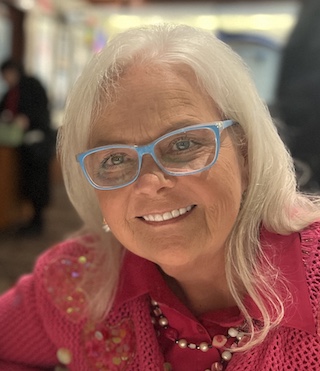-
Follow in His Steps
 Written byKim Solis, volunteer with Iron Rose Sister Ministries
Written byKim Solis, volunteer with Iron Rose Sister MinistriesThis year, IRSM’s goal is to encourage women to be wise, hear God’s Word, and put it into practice. Doing this, we are building our house upon the ROCK (Lk 6:46-49).
The idea of a rock comes up many times in Scripture. In Matthew 16:18, Simon’s name is changed to Peter (which means rock), and Jesus tells him that on the rock of his confession that Jesus is the Christ, the church will be built. Years later, in his first epistle, Peter will again mention a rock.
In 1 Peter 2, he tells us about the living stone and then says that we are built up as living stones to form a spiritual house, one that will proclaim His excellence as sojourners—ones who keep their conduct honorable so their good deeds may be seen, God may be glorified, and foolish people silenced. But Peter warns there are times when we will need to be subject to masters who are unjust, and we will suffer.
It is in this context that Peter pens the famous words that have become titles of books (In His Steps by Charles Sheldon is a quick and interesting read) and initials on bracelets with the WWJD (What Would Jesus Do) campaign:
“For to this you have been called, because Christ also suffered for you, leaving you an example, so that you might follow in his steps” (1Pe 2:21, ESV).
What would Jesus do? Well, Peter thought you might ask. Just read the following verses. Even when suffering unjustly, He did not sin. He did not speak deceit. He did not respond in anger or with threats. He simply trusted God to judge justly.
Jesus was a revolutionary then, and His words continue to be so today.
But they are taking advantage of me! Go the extra mile(Mt 5:41).
But they are verbally slapping me with their scorn and accusations! Turn the other cheek(Mt 5:39).
Politics, opinions, laws, social media – our world is more divisive than ever (or at least so it seems). Treat others as you would have them treat you(Lk 6:31). Love your neighbor as yourself(Mk 12:31). It doesn’t matter who they are, what they believe, or how they act. Love your enemy(Lk 6:35).
Walk as He walked. Treat as He treated. Love as He loved.
With the rise of social media, we often say we “follow” someone when all we really do is observe what they do or say and give it a thumbs up to indicate approval. Occasionally, if we really admire the person, we may buy a product they endorse, watch a movie they are in, and maybe even repost a catchy phrase they use or mirror our fashion after theirs. But that is the extent of our “following.”
But what if you were hired to portray this person in a movie? What would you do to study their voice inflection, habits, and mannerisms? If you really wanted to present an Oscar-winning performance, you would have to convince the public that they were actually watching the original person, not just some random fan.
In 1 Corinthians 11:1, Paul says, “Be imitators of me, as I am of Christ.”
Imitators. The type of followers who step in the exact footprints, with the same actions, the same words, and the same attitudes.
I yearn to be a wise woman, one who builds her house and life on the Rock. Do you?
Let us cling to the Living Stone, allowing Him to build us into a spiritual house, glorifying God with His light that shines through us.
We are portraying Jesus to the world and when they see us, they shouldn’t just see an avid fan, they should say: “She looks like Kim, but she sure doesn’t act like her. If I didn’t know better, I would say I’m seeing Jesus!”
Let me leave you with a few Common Threads to consider:
- What is lacking in your portrayal to reflect Jesus to the world?
- Is there something in your actions or attitude that keeps sneaking through and hampering your imitation of Christ?
- How can you study Jesus to better portray Him to those around you?
-
Following Peter in Repentance
 Written byNaijuvelin Díaz Leal, volunteer for Iron Rose Sister Ministries in Venezuela
Written byNaijuvelin Díaz Leal, volunteer for Iron Rose Sister Ministries in Venezuela The word “follow” indicates that we go after, imitate, accompany, or give continuity to something. As far as repentance is concerned, we understand it as ceasing to do evil and changing one's attitude, grieving, and feeling pain for having offended God.
In Luke 22, the Lord Jesus predicts Peter's denial:
‘Simon, Simon, Satan has asked to sift all of you as wheat. But I have prayed for you, Simon, that your faith may not fail. And when you have turned back, strengthen your brothers.’ But he replied, ‘Lord, I am ready to go with you to prison and to death.’ Jesus answered, ‘I tell you, Peter, before the rooster crows today, you will deny three times that you know me’. (Lk 22:31-34 NIV)
When we decide to follow someone or something, that implies commitment on our part; change, union, fidelity, firmness, and transformation, which are all parts of a continuous process that leads us to adopt certain characteristics by which we imitate a model.
Peter experienced the tragic situation of his denial (described in Luke 22:61-62), which he thought he would never do. However, he proved otherwise with his actions, which is why many label him as a traitor or hypocrite. And likewise, turning his eyes to Jesus, he perhaps remembered His repeated questions: "Peter, do you love me?" (Jn 21:15-19) and even though the Lord knew his heart, He gave the great responsibility of caring for the early church to a man with errors, imperfect.
Throughout the book of John, we observe the dominant characteristics of Peter, passionate about Jesus but, at times, dominated by his emotions, in which his impulsive ego reigned more. But in the presence of Jesus, he bowed down. We notice a fragile, grieved Peter, who leads us to recognize changes in attitudes and behaviors that imply recognizing errors, feeling remorse, and taking measures to not repeat them.
To follow Peter in repentance should be to imitate him in the decision to acknowledge sin, turn from it, and follow the Lord faithfully. It is a commitment to change, bearing fruits resulting from repentance, renewing the way of thinking and acting from a spiritual perspective, according to God's will.
Acts 2:14 teaches us the invitation that Peter makes in Jerusalem in response to that repentance that brought about in him restoration and obedience, fulfilling Jesus' previous command, "strengthen your brothers" (Lk 22:32). It is, then, how Peter revalidates this request, strengthens his commitment to follow Jesus and, in turn, leaves us the great teaching that during this process the mercy of God is glorified, which transforms us through the Holy Spirit. This is living in faith in Jesus, fueled not by emotions, but by the Holy Spirit.
Like Peter, you and I go through processes, perhaps on a daily basis, in the face of a world so convulsed that it weakens us until we fall into sin or we err. Let us remember the faithful witness of Peter, who wept bitterly then went on to seek, through his repentance, our Father's forgiveness. Are you willing to follow Peter in repentance? Do you want to be transformed just like Peter was?
To follow Peter in repentance is to reflect him at every step, to regret or feel deep pain for having offended God. By the grace of Christ, are you willing to revalidate the commitment to change and transformation—to continue in holiness?
-
From Fear to Faith: My Journey
 Written by Elesa Mason, volunteer with Iron Rose Sister Ministries in Texas
Written by Elesa Mason, volunteer with Iron Rose Sister Ministries in TexasDo not be afraid, for I am with you; Do not be afraid for I am your God. I will strengthen you; I will also help you. I will also uphold you with my righteous right hand. (Is 41:10 NASB20)
Fear. It’s probably the loudest voice inside my head: Will I ever be enough? Will I always walk with a cane? Will I ever be able to do the things I used to? These thoughts and so many more flood my mind, especially when I am still.
On November 12, 2020, I told my husband I didn’t feel well. Praise God he recognized I was in trouble and called 911. I woke up several days later in the ICU having just been removed from life support. Those days were frightful as my prognosis was uncertain due to numerous blood clots. Our family endured gut-wrenching conversations to say goodbye; conversations I couldn’t reply to or remember.
After seven weeks of recovery, I came home, weak and unable to walk alone. That tremendous loss of freedom meant I couldn’t do anything; things I believed to be my gifts in service to the Lord. And my life lessons didn’t end there; my body was so riddled with arthritis that the following year I endured three joint replacements just to walk. More recovery, therapy, doing nothing, and worst of all, more fears.
I am a half-glass-full gal. I was so grateful for my improvement as I no longer needed a walker! But why was I still unhappy? Why was I angry about walking with a cane? Bottom line: why did God let me stay if He was going to take away my freedom and ability to do what I wanted: things for Him? I prayed fervently, but for so long there was silence. Silence, until I began to listen.
Music has always been the lifter of my soul. Listening stabilizes my mood and centers my mind away from me and on to happier things. Steven Curtis Chapman touched my heart when he sang, “My Redeemer is faithful and true. Everything He has said He will do. And every morning His mercies are new.”
I came to realize that God let me stay here because He is faithful and true. He answered the prayers of many who loved me. He loved me so much that He needed me to stay here longer, not because He still had much for me to do, but because I still had much to learn about myself and my place in His Kingdom that I could still do with a cane.
But before any of that, I had to deal with my faith.
Faith is the antithesis of fear. Fear made me question everything about the unknown. Faith is belief that God has my unknowns in His hands because He says He does. The prophet and musician Asaph sang “My flesh and my heart may fail, but God is the strength of my heart” (Ps 73:26). After years of stillness, I realized I was not connecting to God through his Word other than snippets that blessed me. Paul teaches “Faith comes by hearing and hearing by the Word of God” (Ro 10:17).
God wants me to rely on Him without reservation. It took God out of the equation when I felt responsible for all the good things I had done. I believe that rain came into my life for a reason; I needed to appreciate the Son. So, I try each day to recognize and praise God for everything in my life by going into his gates with thanksgiving and his courts with praise. God gives me protection and strength but praising Him must come first.
By taking small opportunities to show the love of Christ, conversing with God on a more intimate level, and daily consuming His Word, I am emerging from a me-centered world to one full of possibilities. I still slide back into jealousy when I see pictures of friends skiing or taking walks along the beach. The old Elesa emerges with questions of “why me?”.
God loves me dearly and chose my specific path with all its hills and valleys. His “still small voice” in my quiet moments keeps me centered and focused on the truth. His truth. I continue to do what I can to strengthen my body. But as His precious creation, His truth is I am enough, whether I walk with a cane or not.
My fears are gradually giving way to faith. He has always been faithful and always will be. I look forward to the future God has for me. If I keep Him in my heart and mind, He will never leave me or forsake me, and I believe Him! And so, I use music to fill my soul and remain Christ-centered. What about you?
-
Getting Ready to Meet the Groom; He Is Getting Ready Too
 Written byLuzia Casali, volunteer with Iron Rose Sister Ministries in Porto Alegre, Brazil
Written byLuzia Casali, volunteer with Iron Rose Sister Ministries in Porto Alegre, BrazilThe Word of God applies the symbolism of marriage to the relationship between Christ and His church. Through personal sacrifice, He chose the church to be His bride.
Husbands, love your wives, just as Christ loved the church and gave himself up for her to make her holy, cleansing her by the washing with water through the word, and to present her to himself as a radiant church, without stain or wrinkle or any other blemish, but holy and blameless. (Eph 5:25-27 NIV)
In biblical times, after the groom committed to marriage, he would leave his parents’ house to build his own house. After the house was ready, he would marry and take his wife to live in it. We have the same comparison of Christ with the church in Revelation 19:7: “Let us rejoice and be glad and give him glory! For the wedding of the Lamb has come, and his bride has made herself ready.”
In the Gospel of John, chapter 14, when Jesus spoke to His disciples, He had this Hebrew custom in mind (vv2-3). The following advice, given during that conversation, is useful for the church today.
- Do Not Be Troubled
Jesus advises that even when we face personal struggles and trials, we should follow His steps. He is the way (v. 6). He is the one who will give us the right direction for our lives. We can have the peace that surpasses all understanding only by trusting in Him, having the full conviction that He is preparing the rooms and will come to take us to our eternal home.
- Believe in Jesus and God
He clearly states that we must believe in both the Father and the Son. And if we know Christ, we will know God as well. Whoever sees Christ sees God.
The way we know Christ is by reading the Gospels. They contain the life, teachings, miracles, death, and resurrection of the Son of God.
- Obedience to Christ is a Demonstration of Love
Jesus makes it clear that love for Him and obedience to His commandments always go hand in hand. And how can we obey His commandments? By knowing them.
How can we know them? By studying the Word of God. The Bible is the “mouth” through which God speaks to us. It was written by men, but they spoke on behalf of God (2Pe 1:20-21; 2Ti 3:15-16). It is in the Word that we will know the will and commandments of the Heavenly Father.
- Prayer
Christ wants to have an interpersonal relationship with us. Just as He wants us to know the Father's will and His, He wants to know ours too.
He wants us to ask the Father in His name. It's as if He were our guarantor. While this is fantastic, on the other hand, it creates a lot of responsibility. We can't ask for just anything; we need to be aligned with the Father's will. We need to be grounded in His Word. If it is God's will, it will be granted. We also can't forget that He has sent the Comforter. He promised and fulfilled it. He sent the Holy Spirit, and we are His sanctuary (1Co 6:19).
It is the Holy Spirit who helps us in our prayers. In addition to comforting us, He helps us in our weaknesses and in our prayers (Ro 8:26).
- Remain Faithful
Just as the bride had the responsibility to be faithful to the groom, the church of Christ must remain faithful to sound doctrine and His commandments.
We cannot worship other gods. For God, this is like committing adultery, according to Jeremiah 3:13: “Only acknowledge your guilt— you have rebelled against the LORD your God, you have scattered your favors to foreign gods under every spreading tree, and have not obeyed me.”
Therefore, the groom has already fulfilled His part: He went to prepare a place and sent the Comforter, the Holy Spirit of God. We, as the bride of Christ, should not be worried because we believe that the groom has gone to prepare our home and will come for us. We should, however, have faith in God and in His Son, maintain a constant dialogue with Him through reading the Bible, obey the Word, and remain faithful to our merciful God.
-
God Always Knows
 Written byElesa Goad Mason, volunteer with Iron Rose Sister Ministries in Texas
Written byElesa Goad Mason, volunteer with Iron Rose Sister Ministries in Texas Have you ever loved something or someone so much that you knew in your soul God had a plan for your life with your greatest desire in it? Well, even if you don’t, Jacob did— at least when it came to love. In the beginning of Genesis 29, Jacob begins his journey to find a place to work and live, with his mother’s brother Laban. He needed to find a place to “hide out” to avoid his brother Esau’s anger and desire to kill him for pulling off the successful “deceit of the century” of his father, Isaac, for Esau’s birthright and blessing as the oldest son.
Fear took him there, but love at first sight kept him there in Harran. After staying with his uncle for a month, Laban approached Jacob about a paid position working for him.
Jacob was in love with Rachel and said, “I’ll work for you seven years in return for your younger daughter Rachel.” (Ge 29:18)
Laban readily agreed, and the beautiful wedding was set in motion. However, upon waking up after the wedding night, when the alcohol wore off and the veils were removed, to his dismay, Jacob realized that he had bedded Leah, the older sister, instead of his heart’s desire.
Therefore, he was tricked into an additional seven years. The next morning, Jacob’s ranting led Laban to agree to let Jacob marry Rachel after he completed Leah’s one-week marriage bed, but only with the guarantee of seven more years of labor. I often wonder why Jacob was so shocked at the whole plan. After all, wasn’t it his own deception and struggle for redemption that landed him there in the first place?
By marrying both daughters, he created a very complex, eclectic family of his own. Both women competed for his love and attention. In biblical times, the sign of a successful wife was a fertile woman who could bear many children for her husband, particularly males who would carry on the name as well as the bloodline of the father. Leah, the older daughter of Laban, was described as tender-eyed, while the younger, Rachel, was described as lovely in form and beautiful. It was well known that Jacob deeply loved Rachel and was silent about his feelings toward Leah.
This rivalry leads to the birth of twelve sons, who become the ancestors of the twelve tribes of Israel. The birth of these sons symbolizes the continuation of Jacob's lineage and the fulfillment of God's promise to make his descendants as numerous as the stars.
I often wonder how taking circumstances into our control, such as Laban deceiving Jacob with the “wife switch” wedding ordeal, shows the glory and compassion of the Lord in ways we could never imagine. Leah may have thought she was getting quite a catch, but in the end, she turned out to be unloved and unwanted. God showed Leah empathy by opening her womb to six sons for Jacob, who had no idea during his lifetime what she really did for him… More than 30 generations later (Mt 1), Jesus was born through the line of Judah, Jacob’s fourth son through Leah. Who knew!? God knew!
God uses our unmet expectations to meet His needs— His plans for us. The smile across the grocery store, moving out of the way of an impatient driver, helping a stranger who appears to be in need are ways in which we may have no idea that we are meeting God’s expectations of us. And that’s just the little stuff. When children run away, when marriages fail, when dear friends pass away much sooner than we think they should, God has a purpose and a plan for everything in our lives and decisions.
When we just can’t understand why our plans aren’t turning out the way we had hoped they would, we must believe that God may be changing the wedding ceremony from the dress rehearsal for a reason.
Find a way to encourage those in your lives, including yourself, to trust in the journey deviations that God places in our path to fulfill His desire for salvation for everyone (2Pe 3:9).
-
God Demands Our Love
 byElesa Goad Mason, volunteer with Iron Rose Sisters Ministries in Texas
byElesa Goad Mason, volunteer with Iron Rose Sisters Ministries in Texas I have a message from God in my heart concerning the sinfulness of the wicked: There is no fear of God before their eyes. In their own eyes they flatter themselves too much to detect or hate their sin.(Ps 36:1-2 NIV)
I spent the first 13 years of my life growing up with one brother. Typical brother/sister relationship; friends one minute, then not the next. We never really had that much in common, so our lives and interests went in different directions. It wasn’t until after college when we both were married and building our own families that we grew closer and were more involved in each other’s lives.
Fast forward many years to when most of our children were grown and our lives were successfully running full steam ahead, or so it seemed. One afternoon at the end of a long day, I received a call from him, emotional and very remorseful. He felt God had placed it on his heart to confess a sin that could put his life as he knew it in jeopardy. I was stunned because, other than dad, my brother was the one person in my life whom I felt had such a strong relationship with the Lord that I never dreamed he would ever have to confess a sin publicly, much less to me privately. I was crushed by his sorrow but also amazed by his strength to do the right thing, not knowing the consequences, and to begin a process of confession and subsequent healing that has taken many years to complete.
Since the beginning of time, God has used the sinful nature and weaknesses of man with various personalities to fulfill His will and accomplish His purposes. Apostle Peter comes to mind readily as a sinful man who was impetuous when he quickly lost his faith in Jesus and began to sink in the stormy waters out of doubt and fear (Mt 14:29-31), and as an impulsive man who cut off the ear of Malchus, the high priest’s servant, out of anger because they were arresting Jesus in the garden that fateful night (Jn 18:10). He also quickly declared his loyalty to the Lord and just as quickly denied him three times to protect himself from the angry mob (Mk 14:66-72).
It's so easy to have good intentions in doing the right thing, and just as easy to not. All of that about Peter is to say that God used him in miraculous ways for His will. God channeled Peter’s bold nature to speak an amazing sermon that resulted in the salvation of over 3,000 souls and used him as a pillar in the New Testament church (Ac 10, 15). God is loving and forgiving and used the sinful natures of many people to complete His spiritual purposes; David, “a man after God’s own heart,” Moses, Jonah, Rahab, and the list goes on and on.
After recently talking with my brother, who graciously relived a very difficult time in his life to help me, he explained that, like David in Psalm 38 after his sin with Bathsheba, he felt physically sick and totally crushed down by the Lord because of his sin. He, my brother, had no choice but to confess his sin to his wife and family and throw himself on the mercies of the Lord and those he loved dearly to face whatever consequences he was given. He believed with all his heart that his salvation was because of Jesus on the cross, and not for anything he’s done or could ever do.
God’s favor in us is because of His covenants and promises, period.Like David, despite his sinful nature, God blessed my brother beyond measure, full and packed down. He blessed him with an amazing wife and a long, beautiful marriage, and children and grandchildren who look up to him and honor him as a man of God. As do I. And like Peter, God uses my brother as a pillar in the spiritual community both locally, statewide, and around the world. All because he chose God over sin.
Our relationship with God is wholly dependent on our grateful hearts and true penitence in our sinful natures. God wants to be first, to be loved, and to be trusted in all aspects of our lives and everything we do. Confession is part of that. But living a life with less judgment, filled with loving others more than ourselves, is equally as important in our journeys through this life.
Our reward is an eternity with the very God we worship and the ones we love dearly who have gone before and will follow us after we’re there. I can’t wait!
-
God is Light
 Written by Lisanka Martínez, volunteer with Iron Rose Sister Ministries in Venezuela
Written by Lisanka Martínez, volunteer with Iron Rose Sister Ministries in VenezuelaThis is the message we have heard from him and declare to you: God is light; in him there is no darkness at all. If we claim to have fellowship with him and yet walk in the darkness, we lie and do not live out the truth. But if we walk in the light, as he is in the light, we have fellowship with one another, and the blood of Jesus, his Son, purifies us from all sin. If we claim to be without sin, we deceive ourselves and the truth is not in us. If we confess our sins, he is faithful and just and will forgive us our sins and purify us from all unrighteousness. If we claim we have not sinned, we make him out to be a liar and his word is not in us. (1Jn 1:5-10 NIV)
Change from walking in the darkness to the light…
Sometimes when we are baptized and begin our lives as new creatures, we do not fully understand the meaning of this. Perhaps, for those who grew up in the faith with parents, grandparents, and others setting an example and guiding them from their early childhood, and with constant connection with the Church, it is easier to understand. Even when going through moments of doubt, confusion, and even rebellion, they know the difference between light and darkness.
But for those who, like me, grew up in a secular world, where moral or legal rules were sometimes broken with excuses such as, "It's just part of growing up" or, "I don’t know enough to have an opinion" that encouraged me to do what I knew was wrong, and those differences were harder to internalize.
Did I repent? I thought so, but I made those same mistakes again which was a sign that I was not aware of the nature of the darkness in which I remained.
After many years of visiting the Church of Christ, I decided to be baptized and follow Jesus. I confess that changing my life and going from darkness to His admirable light has been a long process that at times has been uphill. He showed me how deep in that darkness I was, not wanting to know what was abominable to the Lord, and believing, like most of the world, that my actions did not harm anyone, that I tried to respect others, and that I gave everyone their rightful place. That was my mistake until in the church, I started learning about what God expects of His children; that I must obey even when I do not understand, and that in those cases, I must be silent, obey, and pray for the Heavenly Father to give me understanding and to forgive, again, my ignorance.
During the pandemic, I began to notice how others radiated God's light by keeping connected and in communion even without being physically present. I thank God for each of those people who set an example and who, in turn, taught me to reflect God's light to others. I also thank the Heavenly Father that I was able to dedicate myself during all that time to learning more about Him, searching His word, praying, and praising as never before in my life.
Yes, I must confess that's when I noticed, with shame, that my past actions did harm others—especially my beloved oldest daughter, my mother, and myself. That darkness had consequences, but God's wonderful love showed me that fellowship with Him is the answer to everything—that staying in His ways cleanses us from sin, helps us resist temptations, and gives us the way out of every situation. It also allows us to lead by example that the change we have experienced in our lives is because of our obedience to His word.
I continue to sin, yes, but now I have the necessary weapons to face the darkness and the awareness that I must keep the light of Christ shining in my life and show it to those around me so that they also know the salvation and love I found in living in Christ.
Are you going to let yourself be overcome by the darkness, or fight and show the light that is in you?
What do you think you should do when you feel that light going off?
When you go through trials that seem to fill your life with darkness and extinguish the Light that shines in you, think about how the Light of the World came to give us freedom and to shine in the darkness. Stay in communion with Christ and His body, pray, and ask others to pray for you. May God bless you and always guide you into His wondrous light.
-
God's Commitment to Mercy
 Written by Rayne Gomes, volunteer with Iron Rose Sister Ministries in Salvador, Brazil
Written by Rayne Gomes, volunteer with Iron Rose Sister Ministries in Salvador, Brazil“Be merciful, just as your Father is merciful.” (Lk 6:36 NIV)
At my job, we provide services to a public organization responsible for granting benefits to citizens. It’s a normal day for me to serve dozens of people who have had their benefits denied, even though they have every right to receive them. Therefore, they contest the decision because, from a human perspective, everyone should receive what is due to them and it is unfair to not give someone what they deserve.
The spiritual perspective of mercy consists precisely of not granting something that is deserved. For us, this is a tremendous blessing because if we take into consideration what we deserve to receive due to our sinful nature, there would be nothing left for us but eternal condemnation.
The writer of the book of Hebrews talks a lot about the mediation and granting of this mercy in our lives. In chapter 2, verse 17, he states: “For this reason he had to be made like them, fully human in every way, in order that he might become a merciful and faithful high priest in service to God.” It is interesting to see the emphasis that the author puts on the fact that when Jesus came in the flesh, He experienced the same situations as us and lived through the same reality as all humans. However, we know that He did not subject Himself to sin. Therefore, what would make someone turn God’s wrath onto themselves and receive the sentence that we deserved? M-E-R-C-Y.
When we deserved death, condemnation, and eternal distance from God… Jesus came and took our place so that we would not receive what was due to us. What a true relief!
Not only that, but Christ also destroyed that which could disable us eternally, brought us back to the family of God, and can claim that He knows exactly what we go through because He experienced the same pains, temptations, and trials so He could help us while we are in this life. And because He has also experienced this same life, He truly has compassion for us.
We can rest assured that, enjoying this immense benefit provided by Jesus as followers in His steps, there is nothing more important than imitating Him in our lives by also offering mercy to our neighbor. Of course, the application will be different. We cannot make atonement, nor do we need to, because Jesus has already done so, once and for all. However, extending a merciful hand to our brother or sister in forgiveness, love, and empathy leads us to an attitude of mercy, an example left by the Teacher who instructed His disciples in Luke 6:36, “Be merciful, just as your Father is merciful.”
Take a moment to reflect: How can you be better at expressing your mercy towards others?
Remember, Christ has already done the hardest part, and He will help you along the way!
-
Great and Faithful
 Written by Sadia Morales de Mendoza, volunteer for Iron Rose Sister Ministries in Mexico
Written by Sadia Morales de Mendoza, volunteer for Iron Rose Sister Ministries in MexicoGod’s promises are wonderful and sustain me in a world that is upside down. What about you? Have they sustained you? When I have felt most alone, I have been told, "I am with you always, to the end of the age" (Mt 28:20b, ESV).
I remember when I arrived in Mexico, I was just twenty-one years old. Leaving our country of origin was not easy, but migration has always existed. Maybe you have left your city or your home for work or other plans without knowing whether everything would be okay, or thinking nothing would go the way you think. It is there that God's promises take on value and truth.
When I first arrived, I missed my family, siblings, and the church so much. It can be difficult to express what we feel when others think we are the happiest in the world because we are fulfilling a dream or a clear answer from God, but we are in a new place, scared and fearful. I remember this promise: "I sought the Lord, and he answered me, and delivered me from all my fears" (Ps. 34:4). It’s been twelve years in which His promises have been great and faithful, and they have sustained me. "For I know the plans I have for you, declares the Lord, plans for welfare and not for evil, to give you a future and a hope" (Jer 29:11). I believe and trust Him.
The sisters, brothers, elders, youth, and children of the church have become my family. I see in them part of every family member of mine. But even with them, I have sometimes felt lonely, nostalgic, and scared, like a child in the dark of night, waiting for my mom to turn on the light and kiss me on the forehead. But since she can't because of the distance between us, even though I know she won't stop praying for me, I turn to the one true God who can be here with me as well as with her in Honduras. I am reminded of Psalm 121:4-5. "Behold, he who keeps Israel will neither slumber nor sleep. The Lord is your keeper; the Lord is your shade on your right hand.”
And we are given another promise: "And the peace of God, which surpasses all understanding, will guard your hearts and your minds in Christ Jesus" (Php 4:7). If He's done it for me, He'll do it for you.
So, even if your path is difficult—you are changing cities, you are leaving your home country, or you are starting over in a place to which you are adapting—the Lord Jesus will sustain you. He will guard your coming and your going from now until forevermore. And He'll fight for you. So do not turn away from Him, either to the right or the left. Keep on the path, and He will guard your soul. Believe in His promises! Be faithful, for He is faithful; and let us clothe ourselves in love, which is the perfect bond.
God can turn difficult situations into blessings and our bitterest experiences into a sweet testimony of His grace and power. Let us give thanks that His promises sustain us, and in them, we will forever trust.
His promises are many, but which one has been your favorite in the different stages of your life? Can you recognize any?
May the Lord bless your life. He will always keep His promises. Don't stop believing Him!
-
Hindrances to Listening
 Written by Kristi Bond, volunteer with Iron Rose Sister Ministries in Arkansas
Written by Kristi Bond, volunteer with Iron Rose Sister Ministries in ArkansasTherefore, since we are surrounded by such a great cloud of witnesses, let us throw off everything that hinders and the sin that so easily entangles. And let us run with perseverance the race marked out for us. (Heb 12:1 NIV)
We learn a lot just from growing old. Aging brings with it a host of ailments that challenge our physical capacities. Although it’s not unheard of, it is rare for 80-year-olds to run races. My back problems can attest that aging is not always fun! But one of the worst problems I have had in recent years has to do with my ability to hear.
A few years ago, I began to experience brief periods of hearing loss. My ears felt full, and I struggled to hear voices, especially my husband’s low voice. These sensations would last anywhere from three days to three weeks, until last year I lost low-range hearing in my left ear for four months. At work, I had to strain to hear my students. Sitting right next to my husband in the car, I often didn’t know he had spoken to me. And at church, it became hard to praise God with my brothers and sisters because my own singing was all I could hear. The audiologist explained that my ears were producing an internal fluid that impacted my ability to hear and that these episodes would come and go, but get worse with time. My ears are working against me!
Sometimes, we are our own worst enemies. This is especially true when it comes to listening. Our priorities and desires hinder us from hearing others. Sin and self-absorption create an internal fluid that blocks out any sound other than our own voice, and we stop listening for the needs of those around us. It’s easy to lose our focus on what God is trying to tell us. We seek pleasure or rest in things other than God, or we lean into our anger, anxiety, or resentment. These periods of hearing loss can be brief, or we can spend a lifetime ignoring God in favor of our emotions or desires.
Hebrews 12:1 tells us that we are running a race. We have the advantage of a running coach who lives within us—the Spirit of the living God. Are we letting our priorities keep us from hearing Him? Is our sin quelching the Holy Spirit? Daily training is available through the Word of God. Are we able to hear His instructions?
Jesus frequently says to His listeners: “He who has ears to hear, let him hear.” Our relationship with God suffers when we listen only to our own desires. Let’s be Christ-followers who have ears to hear!
We often think of running as an individual sport, but we should not underestimate the importance of knowing our fellow runners. I watched a race in the Olympics this year where one runner accidentally tripped up another participant, and both runners fell and were disqualified. How tragic for those who have trained so hard to get to the race of their dreams! We don’t want to be so self-absorbed that we cause ourselves and others to fall. Put another way, when all we can hear is ourselves, we can’t hear each other. If we are to “run with perseverance”, we will need to encourage and be encouraged by our fellow runners.
As I grow older and experience more and more hearing loss, it takes more effort to listen. I refuse to withdraw inside myself, though. Instead, I will actively seek ways to worship, interact, and connect with others despite the disease I am experiencing. Jesus healed a deaf-mute by touching his ears (Mk 7:31-37), and He can open my ears too – both physical and spiritual. I pray that He will remove the sin and selfishness that keeps me from hearing Him and others as I actively seek to listen.
In what ways can you listen more actively to God this week?
-
His Purpose Defines Our Purpose
 Written by Naijuvelin Diaz, volunteer with Iron Rose Sister Ministries in Venezuela
Written by Naijuvelin Diaz, volunteer with Iron Rose Sister Ministries in VenezuelaI know that you can do all things; no purpose of yours can be thwarted. (Job 42:2 NIV)
Many are the plans in a person’s heart, but it is the Lord’s purpose that prevails. (Pr 19:21)
But the plans of the Lord stand firm forever, the purposes of his heart through all generations. (Ps 33:11)
Acknowledging God's absolute power and dominion over mankind affirms His magnificence and sovereignty; no thought is hidden from Him.
The Word says that what God wills, He does; and all things work together for good.
Acknowledging God has control over all things affirms that nothing is beyond His reach. When we recognize His all-fulfilling dominion, we humbly activate the obedience that molds us and orders our steps by clarifying His purpose for us. We can discern His purpose and define our own, for it is He who puts the will and the doing on our timeline. Consider the attitude of Mary, the mother of Jesus, as shown in Luke 1:38, when she said, ""I am the Lord's servant . . . May your word to me be fulfilled," accepting His dominion and counsel. Through her example, I learn that for God to define His purpose it is necessary to accept His will.
For us to enjoy such great salvation, Mary had to make a firm and positive decision in response to the divine plan. She said yes, opening the possibility of that eternal purpose being fulfilled in her. How important it is to open the way for God to act on our behalf (Ps 138:8). It is a way of getting involved in the commitment we have made.
"God is not the God of nonsense," a sister friend with whom I shared pleasant moments meditating and praying told me, “Because what God wants, He does." This is the phrase that strikes me the most. When I experienced my mother's departure from this earth, I clung very tightly to the quote from Romans 8:28 when the whys came to my mind, and the Word comforted me with this: "All things work together for good." At the time, I still did not understand what that good was. Personally, I understood that for her to have left with faith in the Lord was great gain and that, for me and the rest of the family, brought strength and comfort because we were rooted in the faith and hope of those who leave with God. God glorified Himself; I saw it when a family member was converted to Him; I understood then how God worked His purpose amid both sorrow and comfort.
Another example to consider is that God established a purpose when He created us in His image and likeness. However, it is up to each person to recognize and act on it. I can define God's purpose when I am a reflection of willingness and submission to Him, abandon myself into His hands, trust, and obey Him.
His counsel for eternity is immutable. Trusting in His divine plan can strengthen you in every situation. Waiting on His promise can transform darkness into light. The psalmist suggests that we entrust the way to Yahweh; our longings, our thoughts, and our hope in Him, trusting that the best response is the one He has defined.
We have the freedom to make plans and goals, without considering what God has designed, or simply not seeking His guidance. Is it convenient for me or not? Will God agree? How does God see this within His plans? Will He like it?
Yet, entrusting all your plans to Yahweh will bring positive results to your life. He will affirm your thinking, that is, confirm what you should do. When we have a close relationship with God, we get closer to His purposes and can discover what they are. However, you must consider continually seeking Him, and He will make you understand the way you should walk (Ps 32:8).It is through deep connection in prayer and meditation on His Word that we can discover and define His purpose. How ways can you define God's Purpose in you?
-
Holiness: A Separate, Not Perfect Life
 Written byLiliana Henriquez, volunteer with Iron Rose Sister Ministries in Bogota, Colombia.
Written byLiliana Henriquez, volunteer with Iron Rose Sister Ministries in Bogota, Colombia.When you first heard this verse, "Be perfect, therefore, as your heavenly Father is perfect" (Mt 5:48 NIV), what did you think? Did you associate it with "always behaving well"? I don't remember exactly what I thought, but I probably would have had the same thought. That's a pretty simplistic view of what Jesus really meant.
Today, after several years following Jesus, I realize that holiness is not a destination that we arrive at and remain, but a path that we travel day by day. From experience, I am convinced that holiness is a process of transformation whose goal is to make us ever more like Christ: in His actions, in His way of thinking, of treating others, and of living in obedience to the Father's will. In other words, God perfects us little by little, from glory to glory.
What does this imply?
It implies that we have a lot of work ahead of us. The version of us when we started this race cannot be the same as the one that ends it. We should come to the encounter with Christ as transformed women.
What can we do?
- Recognize that following Christ has a cost.
Jesus was clear: following Him means giving one's whole life to Him (Lk 14:25-33). We no longer command ourselves; we have voluntarily decided to let ourselves be guided by Him.
- Obey with submission and love.
If we already recognize that the Father's will is our priority, then we must surrender to Him with trust and love.
- Cultivate an intimate relationship with God.
We are soldiers in an army commanded by God. To fulfill our purpose, we need to hear His instructions and be in tune with Him through prayer, the Word, and constant fellowship.
It is easier said than done.
However, as the saying goes, “Practice makes perfect.” If we want to be women of faith and holiness, we must practice, practice, practice... until our character is strengthened and it becomes more natural for us to bear the fruit of the Holy Spirit in any of its nine "tastes": love, joy, peace, patience, kindness, goodness, faithfulness, gentleness, and self-control (Gal 5:22-23).
It's not going to go perfectly on the first try. But if we continue to strive with the help of the Spirit, we will be holy as He is holy.
I encourage you to keep moving forward, you're doing well!
-
Honest Words from a God with Integrity
 Written by Beliza Kocev, Brazil Coordinator for Iron Rose Sister Ministries
Written by Beliza Kocev, Brazil Coordinator for Iron Rose Sister MinistriesAll you need to say is simply “Yes” or “No”; anything beyond this comes from the evil one.
(Mt 5:37 NIV)I was baptized in my late teens and was the only Christian in the family. I have a brother who is 12 years younger than me and I would take him to church on Sundays. At one worship service when my brother was four years old, he was having difficulty staying silent during the Lord’s supper and the offering... So I said, “If you don't stay quiet, we're going home!”
A dear brother, who helped me a lot in my Christian journey, turned to me and said quietly so my brother wouldn't hear, “Are you really going to go home if he doesn't keep quiet?” I replied no. He guided me on the importance of keeping my word, if I say I'm going to do something, I need to do what I committed to.
See, my intention wasn't bad; I was an inexperienced 16-year-old trying to get my brother to be respectful during the service. But I knew I wasn't going to do what I said.
One of the most amazing things about God is that He does what He says! “See, the former things have taken place, and new things I declare; before they spring into being I announce them to you” (Is 42:9). Prophecies give us confidence that just as He fulfilled what He promised the people of Israel, He will also fulfill what He promised us. Imagine experiencing the difficulties of being a Christian and striving to do God's will, denying yourself, without being sure that we can trust what He promised us!
God has integrity. Integrity is a moral principle. Having integrity means all your actions and decisions are consistent and honest. We can trust what He says, “For the word of the LORD is right and true; he is faithful in all he does” (Ps 33:4).
Some characteristics of God that show us that His words are honest:
- God is True.
God is true; He is truth itself. God is absolutely trustworthy and true in everything He does.
God is not human, that he should lie, not a human being, that he should change his mind. Does he speak and then not act? Does he promise and not fulfill? (Nu 23:19)
We know also that the Son of God has come and has given us understanding, so that we may know him who is true. And we are in him who is true by being in his Son Jesus Christ. He is the true God and eternal life. (1 Jn 5:20)
- God is Faithful.
God is absolutely trustworthy. His words don't fail. He shows His faithfulness by keeping His promises. He never breaks a contract between Himself and His creation.
Know therefore that the LORD your God is God; he is the faithful God, keeping his covenant of love to a thousand generations of those who love him and keep his commandments. (Dt 7:9)
For great is his love toward us, and the faithfulness of the LORD endures forever. Praise the LORD. (Ps 117:2)
- God is Unchanging.
God's attributes are unchangeable— He does not change— He is not uncertain or inconsistent. He is perfect. His consistency makes His promises firm, bringing us security and hope.
Every good and perfect gift is from above, coming down from the Father of the heavenly lights, who does not change like shifting shadows. (Jas 1:17)
I the LORD do not change. (Mal 3:6a)
- God is Infallible.
Infallible means that He does not fail— does not make mistakes. As God is perfect, He does not fail!
Now to him who is able to do immeasurably more than all we ask or imagine, according to his power that is at work within us. (Eph 3:20)
I know that you can do all things; no purpose of yours can be thwarted. (Job 42:2)
My desire is that you dedicate yourself to studying the Bible more and more to discover the wonderful words of God—words of love, guidance, encouragement, comfort, and blessings— but mainly the words that bring salvation, those that introduce Jesus, our Lord and Savior, and the only way to eternal life.
-
Honest Words of Integrity
 Written by Keren Soraia, volunteer with Iron Rose Sister Ministries in Santa Rita do Passa Quatro, Brazil
Written by Keren Soraia, volunteer with Iron Rose Sister Ministries in Santa Rita do Passa Quatro, BrazilOur Lord says, “Then you will know the truth, and the truth will set you free” (Jn 8:32 NIV). I know this passage is talking about the gospel which gives us salvation and eternal life, but I also believe that it can be applied like this: when we speak the truth, we are free from the possible consequences of sin. When we find someone who tells us the truth, even if it is difficult to hear, we know that we can trust them. Therefore, when we speak the truth, we become trustworthy people.
I thought many times about how to approach this subject — what to say, how to say it. After all, talking about truth is not something our human nature is used to, instead preferring to hide behind lies or omissions, leaving us with the feeling that it is “better this way.” If I lie or omit this fact I won’t have to deal with that person or problem. Our life seems “easier” this way and we don’t notice the resulting problems and consequences. When we do notice, the lie is already a snowball so big that we have no way out other than to resolve the issue and bear the consequences.
Once at my old job, we received a large order for meat. I noticed that this order was taking a long time to come out, and if it was left in the freezer too long, the meat would freeze. Because I was not the supervisor at the time of this order, it was not my problem (yet). But when the part of my shift came when I took over as supervisor, guess what was still in the freezer: the meat. Minutes later, there was an angry customer on the phone. My boss asked what was happening, why the order hadn't been delivered, and an assistant manager asking what he was going to do, why the meats were frozen, and pointing out that if the customer canceled the order, the meats were going to be unsuitable for sale. I thought: what now? Why didn't I say anything—why didn't I resolve it at that time?! Even if it wasn't my responsibility, if I had resolved it, I wouldn't be going through this now. My consequences: stress, a warning, and personally paying for one of the meats that the customer didn't accept.
In the scriptures, we find these passages:
Again, you have heard that it was said to the people long ago, “Do not break your oath, but fulfill to the Lord the vows you have made.” But I tell you, do not swear an oath at all: either by heaven, for it is God’s throne; or by the earth, for it is his footstool; or by Jerusalem, for it is the city of the Great King. And do not swear by your head, for you cannot make even one hair white or black. All you need to say is simply “Yes” or “No”; anything beyond this comes from the evil one. (Mt 5:33-37)
Above all, my brothers and sisters, do not swear—not by heaven or by earth or by anything else. All you need to say is a simple “Yes” or “No.” Otherwise you will be condemned. (Jas 5:12)
These passages talk about similar things such as not swearing by anything and especially by God, and that our yes should mean yes, and our no should mean no. I can't tell you how many times my mother quoted this text to me. I can still clearly hear her. At that time, I didn't understand why. But now I understand: my mother was using the scriptures to teach me about honesty and integrity. She taught me that if I said yes, it should mean yes, and that I should always keep my word so that I would be taken seriously.
Today, being honest and having integrity are such uncommon virtues that when we meet someone like this, it's unusual. They are laughed at, called naive, or told that they don't know how the world works, but that's how Christ calls us to be! We must be honest and have integrity not only concerning money, but with people, feelings, prayers, and especially in our relationship with God.
Having integrity and being honest and true to ourselves frees us from the bonds of sin and the fears that life brings, ready to be filled with the grace and love of God, and it prepares us to pass this grace and love on to others. After all, Christ interacted like this with everyone He met while He was on earth.
Are you and I willing to open our hearts, being true like Christ was?
-
How and Why King Solomon and Israel Turned away from God
 Written by Alina Stout, volunteer with Iron Rose Sister Ministries in Oklahoma
Written by Alina Stout, volunteer with Iron Rose Sister Ministries in OklahomaWe chose to commit our hearts to God. Good! Now, are we guarding our hearts from whatever might try to take it from God?
Let us think about Solomon, a man who was faithful in his earlier years of life but who turned his heart away from God as he grew older.
Solomon was born because of God’s mercy. His father was David, and his mother was Bathsheba. David had Bathsheba’s husband killed after having an affair with her. As a consequence, God did not allow their first child to live (2Sa 11-12). However, once David repented (2Sa 12:13, Ps 51), God allowed them to have a second child named Solomon (2Sa 12:24).
God loved Solomon, and Solomon loved God (2Sa 12, 1 Ki 3:3). God appeared to Solomon one night in a dream to encourage him to ask for a gift. Solomon, out of humility, asked for a wise and discerning heart. God granted him this and much more, including wealth and honor (1 Ki 3:5-15).
God gave Solomon one condition: “If you walk in obedience to me and keep my decrees and commands as David your father did, I will give you a long life” (1Ki 3:14, NIV).
Solomon built the temple of God (1Ki 5-6). Out of humility, he prayed that God would let His Name dwell there. God answered and rested His Name on the temple. (1Ki 9, 2Ch 7).
God reiterates to Solomon His one condition: “If you walk before me faithfully with integrity of heart…I will establish your royal throne over Israel…But if you…serve other gods and worship them, then I will cut off Israel from the land I have given them” (1Ki 9:4-7).
We expect Solomon to be thankful for God’s blessings and to glorify God. But something changed. Solomon, despite having a discerning heart, made a mistake that would turn his heart away from God.As Solomon grew old, his wives turned his heart after other gods, and his heart was not fully devoted to the LORD his God, as the heart of David his father had been.(1Ki 11:4)
Solomon married 700 women of royal birth and had 300 concubines. Some of these women were Moabites, Ammonites, Edomites, Sidonians, and Hittites. He allowed his wives to worship their own gods and began to worship their gods, too (1Ki 11:1-3).
Three gods are mentioned by name: 1-Chemosh, the god of the Moabites, was a god of war who would grant victory in battle to those who sacrificed to him (Jdg 11). 2-Ashtoreth, the goddess of the Sidonians, was also called the Queen of Heaven. She was a goddess of fertility and was Baal’s wife (Jer 44). 3-Molek, the god of the Ammonites, was worshiped through child sacrifice (Lev 18:21). Solomon’s devotion to his wives became a devotion to success, fertility, and child sacrifice. Once Solomon introduced these gods to Israel, Israel continued to worship them for generations (1Ki 11:33).
Solomon is an example of someone whose heart was committed to God but whose commitment became divided. He did not guard his heart, and both he and Israel would face the consequences of their actions. If only Solomon had listened to his own wisdom in Proverbs: “Above all else, guard your heart, for everything you do flows from it” (Pr 4:23).
God was angry with Solomon, and He told him that the kingdom of Israel would be torn in two (1Ki 11:9-11). Unlike his father David, Solomon did not repent. In a sad irony, David’s repentance allowed Solomon to live, but Solomon’s lack of repentance led to the downfall of the entire nation of Israel.
Despite Solomon’s actions, God mercifully promised to save one tribe of Israel and Jerusalem (1Ki 11:12-13). That tribe, Judah, is the tribe that Jesus was from.
There are two lessons that can be learned from Solomon’s life.
1. Guard your heart for God from anyone or anything else that might try to steal it.
2. God’s heart is committed to you.In order to keep our hearts committed to God, we need to frequently evaluate our own lives to see whether we are letting anything else lead our hearts astray. Lean on your Iron Rose Sisters through this process.
What do you need to let go of so that you can let God have your whole heart?
-
How Do We Follow in His Steps Today?
 Written byJuaneylla White, Iron Rose Sister Ministries Board Member in Texas
Written byJuaneylla White, Iron Rose Sister Ministries Board Member in TexasHow do we follow in His steps today? I have been asked this question before.
I think that in their journey with the Eternal One, many people also ask themselves: how can I follow in the steps of Jesus? However, only an honest introspection of how we are walking towards eternity drives us to turn the key within ourselves and seek a more assertive direction, turning our hearts to listen to the voice of our Shepherd.
In John 10:27, Jesus declares, “My sheep listen to my voice; I know them, and they follow me” (NIV). I was not always a sheep, but from a very early age, the seed of faith had been planted in my heart. It took almost two decades, since my early years of life, for me to understand that to be a sheep, I needed to let Jesus be my shepherd and that to follow in His footsteps, I needed to calculate how much this decision would cost me.
I needed to understand that the false gods needed to leave my heart so that Jesus could enter and reign — that I was one of those gods with my own will and righteousness that in reality were just filthy rags (Isa 64:6). I also needed to understand that in addition to repenting and recognizing my desperate need for a Savior, I needed to deny myself, take up my cross, and follow Him day by day.
For me, following in the footsteps of Jesus has always meant walking as He walked. It seems simple, but it’s not so easy when human nature wants to speak louder and fights against the spirit. Living life in obedience to the Word of God means submitting to His will for my life. I see that this is much more than following rules or completing a weekly checklist, but rather a daily lifestyle that not only pleases God, but represents Him, glorifies Him, and imitates Him not only in what suits me but in what most challenges my human and carnal side.
It is renouncing myself and seeking sanctification daily. It is being aware that if I fall, there is a hand that can lift me up; there is a new beginning because God's forgiveness is waiting for me. Following in the steps of Jesus is definitely going against the grain of a fallen society that is separated from God, understanding that my journey (or that of any sincere Christian) towards heaven is not easy, but it is possible because of Christ and His Holy Spirit that lives within me. It is understanding that I am in this world, but I am not from here. It is being like a child in His purity without being childish, rather serving Him with understanding and discernment in my heart and mind. The more I seek Him, the more I know Him, and the more intimacy and communion I have and desire.
The enemy has always used strategies to divert us from God’s purpose and destroy us, so Jesus came on our behalf to destroy the works of the devil and give us life, and life in abundance (Jn 10:10). Following in His steps is having the privilege of being a Christian, of being chosen, of being a beloved, redeemed, proven daughter, a representative of heaven, a messenger of His Word.It is serving and loving my neighbor without falling into the trap of performance or “deserving.” It is living as someone whose purpose in life is eternal things, knowing that I am a pilgrim here and that my homeland is heaven and that is where my treasure is; that is where those are who left me a legacy of faith in Christ. Following in His steps is walking in obedience and submission in the certainty that as a co-heir of Christ, one day I will be in His presence sitting at His table, enjoying full communion where I will see Him face to face.
Following in the steps of Jesus in obedience has been and continues to be the best and most important choice that I make every day, simply because I love Him!
Whoever has my commands and keeps them is the one who loves me. (Jn 14:21a)
My desire is to continue following the Lord and encourage others to do the same. May God help us!
-
How I See God’s Faithfulness in My Life
 Written by Ana Cardoso, volunteer with Iron Rose Sister Ministries in Ecuador
Written by Ana Cardoso, volunteer with Iron Rose Sister Ministries in EcuadorThe Word of God says: “For the LORD is good and his love endures forever; his faithfulness continues through all generations” (Ps 100:5 NIV).
Currently, the concept of love is totally distorted by the world, compared to the love that God teaches us. The love we learn from the world is based on the law of giving and receiving in which for you to receive, it is necessary to give. Often, we Christians follow this pattern.
God's love is eternal, faithful, and incomparable. Many times in my life, I have come to doubt God's love, thinking that because I had given in to sin, God would no longer love me and that perhaps He was tired of my excuses, but I have learned over these 19 years that God's faithfulness never ends. He loves me so much and never fails me. Even knowing this, I continue to make mistakes, yet He continues to love me and teach me about His infinite faithfulness. I often compare myself to the people of Israel, who disobeyed God again and again, and I see that God remained faithful to the Israelites, and still does to us to this day.
But it was because the LORD loved you and kept the oath he swore to your ancestors that he brought you out with a mighty hand and redeemed you from the land of slavery, from the power of Pharaoh king of Egypt. Know therefore that the Lord your God is God; he is the faithful God, keeping his covenant of love to a thousand generations of those who love him and keep his commandments. (Dt 7:8-9)
If, like me, you feel that God is no longer willing to forgive you for the sins you have committed, remember what John said: “If we confess our sins, he is faithful and just and will forgive us our sins and purify us from all unrighteousness” (1Jn 1:9). This is one of the promises that God made to us; we just have to confess our sin and believe in the Word.
In 2023, I was in a training program for young missionaries, and at the end of the year, I discovered that my missionary field would be in another country. At the time I didn't have a single dollar saved to buy the ticket. It was at that moment that I saw that God never abandoned me and remained faithful, even if I didn't deserve it. There were days when I let despair overcome me and I didn't remember who was on my side. It was a unique experience where I was able to have the pleasure of seeing the power of God. As I said, I fail with my faithfulness, but God has never failed and will never fail.
Here is a trustworthy saying: If we died with him, we will also live with him; if we endure, we will also reign with him. If we disown him, he will also disown us; if we are faithless, he remains faithful, for he cannot disown himself. (2Tm 2:11-13)
Dear sisters, I encourage you to seek to know more about God's love and faithfulness, and most importantly, put it into practice. After I started looking more into this, my perspective changed when I saw challenges appearing before me. Now I can say that I finally understand that God's faithfulness has always reached me, and it reaches you, too.
No one can be perfectly faithful, but our God can! When we are not faithful, He remains faithful because He maintains consistency. And, if God is faithful, we have confidence that we will receive the reward He promised us.
-
How Precious It Is to Live Under the Wisdom of our God!
 Written byJohanna Zabala, volunteer for Iron Rose Sister Ministries in Venezuela
Written byJohanna Zabala, volunteer for Iron Rose Sister Ministries in VenezuelaGod's wisdom is and always will be a precious gift that comes from the Eternal, manifesting itself in you; in how you carry yourself and in the words that reflect the character of Christ, and not in human knowledge. In James 3:17, it says: "But the wisdom that comes from heaven is first of all pure; then peace-loving, considerate, submissive, full of mercy and good fruit, impartial and sincere" (NIV).
Such divine wisdom is acquired by obeying and persevering in passion, discipline, and love toward God (Pr 1:7); therefore, it is of heavenly origin, it is different from human wisdom, it is asked for in faith, it is demonstrated in trials and difficulties, it is like a guide to daily life, and it produces, among many other virtues, spiritual growth.
As a daughter of the King, practicing God's wisdom fills me with perfect peace and unique joy in the midst of a humanity without that wisdom. Therefore, "Be very careful, then, how you live—not as unwise but as wise, making the most of every opportunity, because the days are evil" (Eph 5:15-16).
That is why living day by day in wisdom makes it possible to make the most of every opportunity to experience and act out the immense benefits of security and meekness in Christ Jesus. It becomes a blessing to be able to speak for God in every moment and everywhere I am, bringing calm, life, and purposes that glorify His holy name. This is much better than material well-being or personal success.
In my daily life and in the places that God Himself allows me to be, it is for me an occasion to speak of the most beautiful gift of love that is Jesus and His Holy Spirit.
By having in common the same heavenly Progenitor, we are sisters of the same Father, who is the giver of His infinite wisdom. This entails being attentive to human machinations that counteract the spiritual, a permanent struggle that requires self-control in the Holy Spirit and the soul. His wisdom, which comes from heaven, is like a rainbow of colors that gives light to the heart, the mind, and the way to reflect a full and meaningful life, providing the necessary guidance and knowledge on how to move forward daily and in harmony with God’s divine will.
So, look how beautiful that wisdom is, highlighted in Proverbs 3:13-26, which says:
Blessed are those who find wisdom, those who gain understanding, for she is more profitable than silver and yields better returns than gold. She is more precious than rubies; nothing you desire can compare with her. Long life is in her right hand; in her left hand are riches and honor. Her ways are pleasant ways, and all her paths are peace. She is a tree of life to those who take hold of her; those who hold her fast will be blessed. By wisdom the Lord laid the earth’s foundations, by understanding he set the heavens in place; by his knowledge the watery depths were divided, and the clouds let drop the dew. My son, do not let wisdom and understanding out of your sight, preserve sound judgment and discretion; they will be life for you, an ornament to grace your neck. Then you will go on your way in safety, and your foot will not stumble. When you lie down, you will not be afraid; when you lie down, your sleep will be sweet. Have no fear of sudden disaster or of the ruin that overtakes the wicked, for the Lord will be at your side and will keep your foot from being snared.
This text teaches how precious it is to be under the wisdom of our God, while its daily practice makes us wise and prudent. How wonderful it is to stand at His feet and in His heavenly Kingdom. Blessed are we.
And if at times you feel weak, feel unworthy of His grace and His great love, remember: You are in His grace, in His forgiveness and permanent life, which shows us the possibility of continually coming back to the spiritual, through the Holy Spirit and His perfect wisdom.
Discern in your heart attentively under the light of the Holy Spirit and His wisdom, observe yourself at every moment, and ask yourself: Do I have the wisdom that comes from God or only my own knowledge? "If any of you lacks wisdom, you should ask God, who gives generously to all without finding fault, and it will be given to you" (Jas 1:5).
-
How Sin Hinders Our Listening Clearly
 Written by Deanna Brooks, volunteer with Iron Rose Sister Ministries in Arkansas
Written by Deanna Brooks, volunteer with Iron Rose Sister Ministries in ArkansasWhen I was growing up, my daddy sometimes told me, “It’s hard to hear God’s voice when you’ve already decided what you want Him to say.”
The Hebrew writer tells us, “Therefore, since we are surrounded by so great a cloud of witnesses, let us also lay aside every weight, and sin which clings so closely, and let us run with endurance the race that is set before us” (Heb 12:1 ESV).
Picture a runner strapping on ankle weights and a heavy backpack just before an important race. Do you think he will have a good race? This is what the author of Hebrews is talking about when he tells us to lay aside that which can slow us down.
Sin is a weight that slows down or interrupts our walk with Jesus.
We all know how difficult it is to talk to someone through a closed door. When we talk to or listen to our Heavenly Father, we need the door open wide with nothing to hinder communication.
Sin is a barrier…like a closed door…between us and God.
- Sin often comes with pride…and pride prevents us from listening because we want to be in control. We may have decided what we want God to say.
- Sin deceives us into thinking God has moved away from us and no longer cares.
- Indifference, fear, or shame about our sin will close our ears to His voice. The evil one wants us to concentrate on our sin. However, God has told us to give our sin to Him, and He will wash it away.
Contrast the response of Adam and Eve with David when each were confronted about sin. Adam and Eve were afraid and hid. David responded, “I have sinned against the Lord” (2Sa 12:13 NIV).
Have you experienced the pain of avoiding a friend because of “something” that happened?
Now, let’s apply that to our relationship with God. Whether it is an obvious sin that we are aware of, or we’ve simply quit putting God first in our lives and we know things aren’t right, we feel the barrier, and we are no longer hearing Him.
The prophet Habakkuk wrote: “Your eyes are too pure to look on evil; you cannot tolerate wrongdoing” (Hab 1:13). Our Heavenly Father wants us to avoid sin.
The most important thing we need to remember is God will never leave us. We find this promise throughout Scripture. We find it first in Deuteronomy 31:8: “He will never leave you nor forsake you.” Our God pursues us to protect us from sin.
Sin is always the barrier that separates us from feeling connected to God.
Isaiah wrote: “Your iniquities have made a separation between you and your God” (Isa 59:2 ESV).
God knew this and understood it. This is why He tells us over and over in Scripture to bring our sins before Him so we can be cleansed.
Think on the following Scriptures…about how they give us hope and assurance:
“If we confess our sins, He is faithful and just and will forgive us our sins and purify us from all unrighteousness” (1Jn 1:9 NIV).
“Therefore, there is now no condemnation for those who are in Christ Jesus, because through Christ Jesus the law of the Spirit who gives life has set you free from the law of sin and death” (Rom 8:1,2).
“The blood of Jesus, his Son purifies us from all sin” (1Jn 1:7).
“But if anyone does sin, we have an advocate with the Father, Jesus Christ the Righteous One” (1Jn 2:1). Jesus, our Redeemer, is standing beside us as we approach the Father.
With those promises that show the Father’s loving-kindness towards His people, we need to ask ourselves what we are involved in that may hinder us from hearing the words of our Heavenly Father.
-
How to Give Thanks in Word and Deed
 Written by Karla Dourado, volunteer with Iron Rose Sister Ministries in João Pessoa, Brazil
Written by Karla Dourado, volunteer with Iron Rose Sister Ministries in João Pessoa, BrazilAnd whatever you do, whether in word or deed, do it all in the name of the Lord Jesus, giving thanks to God the Father through him. (Col 3:17 NIV)
Gratitude is an attitude that transforms lives and the way we relate to each other and to God. Words are important. They can edify, encourage, and convert. But true gratitude goes beyond what we say—it is demonstrated by our actions. James 2:17 says that faith without works is dead. Therefore, gratitude must be shown through our attitude.
Gratitude is action: Serving others, helping someone in need, or even carrying out community tasks are good examples of how we can manifest what 1 Peter 4:10 says: “Each of you should use whatever gift you have received to serve others, as faithful stewards of God's grace in its various forms.”
Colossians 3:17 invites us to reflect on the way we live our daily lives and the importance of recognizing and thanking God in every aspect of it, recognizing the blessings we receive, even in the smallest things. “Give thanks in all circumstances; for this is God's will for you in Christ Jesus” (1Th 5:18).
As I write, I remember the times when I went through difficulty in an area of life: I could only focus on the problem. For some time now, I have been trying to practice gratitude. With this change in mindset, I have been able to defocus from the problem and see lessons for myself that I can share with others.
It was a simple choice, but it has had a huge impact on my life and consequently on those around me.
The depth of this biblical guidance continues to impact my life. The idea that everything I do must be done in the name of the Lord makes me realize that I need to be constantly vigilant so that what I say and what I do are aligned because this represents the faith I profess.
Two years ago, something happened in my life—a really challenging moment. Before, I would have let impulsiveness dominate me... but for two years I have been asking God: How can I act in this situation in the name of Jesus? With this, I have been choosing patience and empathy, rather than anger and guilt.
Instead of getting into arguments, I now choose to wait for God to act, with gratitude for everything that happened in these two years. It is not easy, but it is not impossible when we let the Lord direct us. Breathing and letting God act is rewarding, even amid difficulties.
Today, I can see God's care unfolding in every situation and I can thank Him with sincerity from my heart.
I encourage everyone who reads these brief words to be grateful in any circumstance and experience God's care no matter how complicated the situation seems to be.
Page 3 of 7

